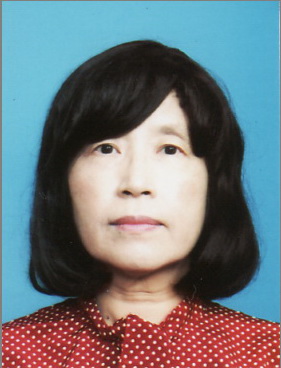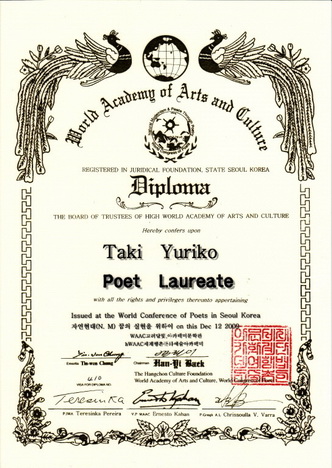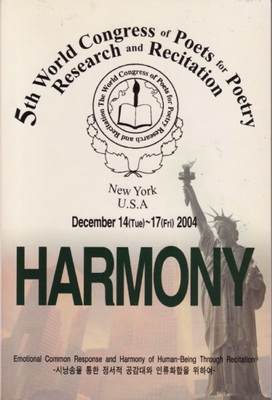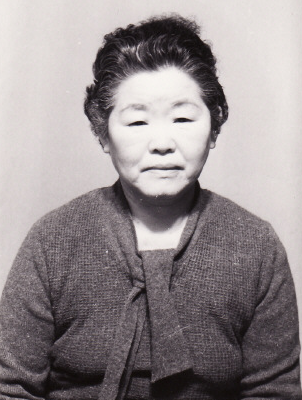|
TAKI Yuriko 
Japanese Poet and Essayist

Biography of TAKI YURIKO

Born in Tokyo, Japan. JOBS worked in NIPPON RADIO BROADCASTING works now in KUMON Institute of Education Instructor in Japanese for includes foreigners at Institute of Education MEMBER of : International Writers and Artists Association The International Forum for the Literature and Culture of Peace World Congress of Poets-World Academy of Arts and Culture The 1st Poetry Advisory Committee of the Crane Summit 21st Century International Forum World Poets Society (W.P.S.) http://wps-poets.blogspot.com/2007/05/taki-yuriko.html World Congress of Poets for Research and Recitation Society of NIPPON RADIO BROADCASTING Global Harmony Association Honorary Degree of Doctor in Literature from World Academy of Arts and Culture (Approved by UNESCO) WORKS IN JAPAN The World of Atomic Bomb Poem Anthology(published by Kadokawa)*1 My Revolution Square(published by Shichousha) The Japan of Atomic Bomb Literature Anthology(published by Horupu)*2 Poems Against The War Anthology, joint with USA poets 2003 (published by Souhuusha) Genocide written with Dr.Ernesto Kahan (published by Nihon Tosho center in July 2006) IN GERMANY SEIT JENVEM TAG ANTHOLOGY (published by Fisher Taschenbuch Verlag)*3 *1,2,3 TAKI Yuriko was the only poet born after the Second World War, to have poetry selected by the editors who compiled the anthologies. IN ROMANIA 8500 CHRISTS, LES 8500 CHRISTS(published by Stand @ rt) the first edition in 2002 and the second edition in 2003 IN USA Internet publishing http://www.TakiYuriko.org Harmony in NewYork by WCPPRR IN FRANCE ANTHOLOGIE SECRETE (will publish by Jean-Paul Mestas ) Selected by the editors who compiled the anthology. IN OTHER COUNTRIES and AWARDS In 2007 award from International Forum for the Literature and culture of peace in Argentina In 2007 award from The Embassy ofHonduras in Argentina In 2007 award from The National Museum in Buenos Aires, Argentina In 2006 received the Honorary Degree of Doctor in Literature .from World Academy of Arts and Culture (Approved by UNESCO) In 2006 “THE BEST POETS OF 2006” from International Writers and Artist Association with Dr.Ernesto Kahan In 2006 “NeoungKeoum prize”from the Hangchon Culture Foundation in Korea In 2005 “Medal Festos”from International Society of Greek Writers & Arts In the Newspaper or Magazine of Australia, Brazil, China, Korea,Mongolia, India, Greece and France. In the Dictionary of 2000 Outstanding People 2003 by International Biographical Centre Cambridge in U.K. Literary Works translated into 11 Languages from poetry book “8500 Christs” English, French, German, Spanish, Portuguese, Hangul, Chinese, Russian Romanian, Mongolian, Greek
ADDRESS 1893-48 OSAKA-CHO U SHIKU-SHI IBARAKI-KEN, JAPAN, 300-1286(c/o Yamamoto).
Websites www.takiyuriko.org http://wps-poets.blogspot.com/2007/05/taki-yuriko.html
http://peacefromharmony.org/?cat=en_c&key=360
---------------------------------------------------

SAYING “HIROSHIMA” Could saying “Hiroshima” Ever elicit A compassionate “Oh, yes, Hiroshima”? Saying “Hiroshima” Arouses retorts of “Pearl Harbor,” “Nanjing massacre,”* “Fiery Manila executions Women, children Herded into trenches, Doused with gasoline And burned alive.” Reactions to Saying “Hiroshima” Reverberate With fire and blood. Say “Hiroshima” And no one sympathizes. Instead, the fury Of Asia’s voiceless Dead and raped Erupts. If we wish to hear Compassion when Saying “Hiroshima,” We must truly Lay down all arms. We must remove Foreign military bases. Until that day, Hiroshima will evoke The bitterness of Cruelty and distrust, And we will be pariahs Burning in atomic energy. For we Japanese To hear a compassionate “Oh, yes, Hiroshima,” We must purify Our soiled hands.
© SADAKO KURIHARA
Translated by John and Deborah Saxon with Taki Yuriko
* Nanjing, in West known as Nanking
ヒロシマというとき
© 栗原貞子
〈ヒロシマ〉というとき
〈ああ ヒロシマ〉と
やさしくこたえてくれるだろうか
〈ヒロシマ〉といえば〈パール・ハーバー〉
〈ヒロシマ〉といえば〈南京虐殺〉
〈ヒロシマ〉といえば 女や子供を
壕のなかにとじこめ
ガソリンをかけて焼いたマニラの火刑
〈ヒロシマ〉といえば
血と炎のこだまが 返って来るのだ
〈ヒロシマ〉といえば
〈ああ ヒロシマ〉とやさしくは
返ってこない
アジアの国々の死者たちや無告の民が
いっせいに犯されたものの怒りを
噴き出すのだ
〈ヒロシマ〉といえば
〈ああ ヒロシマ〉と
やさしくかえってくるためには
捨てた筈の武器を ほんとうに
捨てねばならない
異国の基地を撤去せねばならない
その日までヒロシマは
残酷と不信のにがい都市だ
わたしたちは潜在する放射能に
灼かれるパリアだ
〈ヒロシマ〉といえば
〈ああ ヒロシマ〉と
やさしいこたえがかえって来るためには
わたしたちは
わたしたちの汚れた手を
きよめねばならない
In Japan, where the two atomic bombs were dropped at Hiroshima and Nagasaki only in 4 days, almost all the A-bomb poems are testifying the misery of the A-bombs from the victims’ standpoint. Among them this poem makes us realize that the misery of the A-bombed experience will not be really transmitted all over the world until we face directly the truth of the modern history and admit the crime the Imperialism of Japan committed in the Asian countries in the Second World War. It is said that this poem is most recited and approved in antinuclear meetings in Japan. It is also said that it has been adopted at some schools in US, the very country which dropped the A-bombs, and has been sympathized. I want you to look straight at the facts which the survived victims, including this author, have been carrying since they were bombed: “the inverse proportion of leukocytes gradually increasing and red corpuscles decreasing, destroyed bones, destroyed blood, destroyed chromosome, all the organs undermined” ___ from ‘We Still Have Time’ by the same author. She was A-bombed at her own house 4 kilometers far from the center of the explosion in Hiroshima on 6th August, 1945. Comment by Taki Yuriko 1913-2005 栗原貞子
わずか4日の間に広島 長崎 と二度も 原爆投下にあった 日本では 被害者の立場からの原爆の悲惨さの証言が 原爆詩の ほとんどを占める。
その中で 近代史の真実にきちんと 向かい合い第二次 世界大戦下の 日本帝国主義が アジアの諸国に対して犯した罪を きちんと認めることによってのみ はじめて 被爆体験の悲惨さは 世界中に 伝えられる と気づかされる 詩だ。
国内の反核集会で 最も多く朗読され 支持されている詩 と聞く。原爆を投下した当のアメリカの一部の学校の教科書にも彼女の詩はとりあげられ、共感をよんでいるそうだ。
被爆の結果 生き残った者が 作者を含み 背負った現実も直視してほしい。
「次第に増殖し 減少する白血球と赤血球の反比例、犯された骨、犯された血、犯された染色体、むしばまれた全組織」―同じ作者による『まだ時間はある』よりー
1945年 8月 6日 広島の爆心地 4キロ 地点の自宅で被爆。 解説 多喜百合子
--------------------------------------------------
Dear Dr. Leo Semashko
I introduced Sadako Kurihara's poem "Saying Hiroshima" in the Homepage of WCP/WAAC. Please click www.worldcongressofpoets.com. She was a poet appeared on the first page of the 3biggest newspapers in Japan when she died. I do not know such big articles as a poet before her news. But she could not receive any prize in Japan.
With warmest Taki Yuriko Japan
06/08/09
*****************************
REAL CAUSES OF THE HISTORIC GENOCIDE
Written by Taki Yuriko from Japan
Translated into English by H. Hotta In 2009 the financial crisis which stemmed from the United States in 2008 is still spreading rapidly all over the world. Nobody could declare that it will not develop to the worldwide panic like the Great Depression in 1929. Reflecting the global situation at that time, and considering the relation to the tragic genocide which occurred after that, I dare to deliver here this study though I know it is still incomplete, wishing it to help preventthe tragedy. 1 ___ Relation between the Genocide and the Financial Crisis The world economy drastically broke down in 1929 when the speculation aiming only at profits by stock trading with, so to speak, a slip of paper became the mainstream instead of the wholesome investment in the capitalistic economy at that time. Under its full influence the newly-born great powers invaded other countries to find a way out, which led to the Second World War. Roughly speaking, the aggressor nations justified their invasion to rebuild their economy supported by their peoples, and they headed straight toward the totalitarian countries. Simultaneously the Holocaust by German Nazis and the Nanjing Massacre by Japanese imperialism left the worst marks on the human history. I think the remote but main cause of those two cases of genocide was the world financial crisis. It would be just a formal excuse that in the religious or racial conflict only they could preserve the peace of the community because of their racial superiority. Owing to that excuse a lot of common people were driven out to war and were organized into the groups to execute genocide. Isn’t it unnatural to think this process made the tragedy bigger and bigger? 2 ___ Cases in the History First I would like to consider the historical backgrounds how the two cases of genocide occurred. The Great Depression, which started at Wall Street on October 24, 1929, made the Credit Anstalt, the greatest bank in Austria, bankrupt in 1931, and brought the financial crisis in Germany, spread to the East European countries and finally all over the world. 1)Background How the Nazis Germany Went to Holocaust Germany, the defeated nation in World War I at first, was severely exacted heavy reparations from other victorious countries and weakened very much, which pushed its economy down to the bottom in the Great Depression. With the expectation of the people who were suffering from bankruptcy and unemployment, the Nazis made a great advance and the Hitler Cabinet was born in 1933. Among the Great Powers, compared with those that had already had their colonies such as the United Kingdoms and France, those that had not yet had such as Germany, Italy and Japan were directly influenced by the Depression. The first work the Nazis did was to suppress the communist party born about the same time and the thoughts of the intellectuals. Anyhow it was necessary that the people’s dissatisfaction with economy should be turned outside the country. And finally Germany invaded Poland in 1939. The Nazis also made the people direct their discontent against the Jews many of whom were in the center of the European economy, confiscated their wealth, set up the fearful target to purify the race to eliminate them, and pushed their way to the Genocide. People had a dislike to the Rothschilds, a Jewish mammoth capitalist family in Britain, who dominated the Western Europe financial circles then. They made full use of this repulsion of the people to promote their plan to exclude the Jews. They cleverly turned the economical dissatisfaction of the German people to other races or countries, forced the military expansion and rushed their way to the totalitarian nation, fascism. They asserted the predominance of the German Race and justified the Jew slaughter. It should be noticed here that they began to get rid of their political rivals, the communists or the intellectuals having no relation to the difference of religion, and gradually came to kill the socially weak people, the Romany, and finally reached the Jew Genocide. 2) Background How Japan Invaded China and Forced the Nanjing Massacre In the Depression after World War I Japan was also influenced greatly by it because it had no colony like Germany or Italy among the great powers. Japanese economy had already been weakened owing to the Great Kanto Earthquake and domestic depression, and so when the global depression occurred, many companies went bankrupt, many people lost their jobs, and even food could hardly be supplied because of cold-weather damage and poor harvest continued. In Japan, too, like Germany, a totalitarian fascist political party was born as well as the parties for laborers and tenant farmers. The government at the time oppressed the public opinions like Germany by the Maintenance of the Public Order Act and other means, and tried to turn outside the people’s economical dissatisfaction. In 1931 Japan had already begun invading China prior to Germany. The Japanese Government also asserted the Japanese race’s predominance, and with the official reason that Japan should protect Asia from the European hegemony began to invade China, connecting to the Nanjing Massacre. There are many common features to go to fascism between Japan and Germany. 3 ___ Present Situation Next, about such current conflicts as the problems between the US and Islam or between Israel and Palestine, you will get a clearer view if you consider them in terms of economy like the cases of Germany or of Japan mentioned above. To take the Middle East problems as an example, Israel offers some military bases so that the US may rule over the Middle East and is made to buy lots of arms including nuclear weapons produced in the US. This is not only enriching the US war industries but is playing the role of making the base to strengthen the US rule over the oil resources in the Middle East. So the countries in the area repel the US and abet terrorism. Israel, on the other hand, built a big wall around the Palestine residential area like the one that once divided east-and-west Germany to rule over the Palestine economy. The Palestinians shut up inside are the more repelling. I think it is at least after the second reason that the wall is to protect the people against terrorism. I think the way of thinking that the conflicts will occur because of religious or racial confrontation is just a convenient excuse for the rulers who give priority over all others to the profits of some big companies and stockholders to justify their massacre and invasion. 4 ___ To Learn from Tunisia, Melting Pot of Culture The religious or racial differences will hardly be important in such a country as is moderately wealthy and the people will not so mad in speculation. Furthermore people there can coexist respecting the culture of the others. I would like to take, as such an example, Tunisia, which is in Northern Africa and encourages tourism in policy. It is only 40% of Japan in area, but has as many as 8 world heritages registered in UNESCO, including 1 natural heritage. It is a very international country crowded with people from Europe for the holidays. Looking back at its history, it had been invaded by the Phoenicians, the Roman Empire, the Byzantine Empire, the Islamic Arab Dynasties, the Spanish, the Ottoman Turkish and as the French Colony since it was built by the Berbers in 2,000 BC. They had been through various kinds of hardships, and at the same time various kinds of cultures came into it. All the cultural heritages are still now succeeded as they are after it became independent. Far from the images of poverty, bad sanitary or bad public peace conditions reminded by the word ‘Africa’, it maintains friendly relations with many countries in the world making the most of their super-first class resorts and historical heritages which seem to be superior to those in Rome, Italy. Tourists from France, from which they won their independence, visit and spend much money there , too. Talking of religion, Islam, Judaism and Christianity coexist in peace, and each of them has nice mosques, synagogues and churches which tourists can visit to see. Concerning Judaism, a lot of Jewish people who escaped from the Nazis were accepted by the Tunisians while many of them became sacrificed in Europe. The prosperity of Tunisia today, in which such various cultures coexist, is based on the wisdom they have learned from their merciless history of invasion, and they have realized the peaceful land making the melting pot of tourism and culture to be their resource instead of playing the money games. Tunis, its capital, was designated as the international city of culture by UNESCO in 1997. 5 ___ Conclusion We must now discern exactly that the invasions and the massacres in the past were caused by the failure of the money games and the economic discrepancy, and consider what we should do to avoid them so that a feeling of a blockade grown out of the failure of the money games and the financial crisis which is like the case in 1929 and is said to occur once in a hundred years will not lead us to a new invasion and massacre. Or otherwise we, the average citizens, might be manipulated by the politician’s ostensible excuse ‘religious or racial antagonism’ and become executors of invasion and massacre like under World War II. We should bravely appeal again with all our might that even in the field of education, literature and philosophy, our society which will put the highest priority to economy and spend money not on investment but on speculation will finally ruin both the earth and humankind itself. We, the ordinary citizens, must have the discernment now that we should not be confused by the counterfeit excuse that might lead us to absurd massacre or invasion. ----------------------------------------------
A DEAD CHILD AT HIROSHIMA The sound of a bat flapping its wings Mama Is the sound of my knocking? A hole gapes in the sky Mama Is the scar of clouds scorched at the scattering of my fresh. The voice of Emperor Hirohito praying, Is my alarm clock screaming at me never to sleep. Look, Mama My little sisters are playing over my head. From inside my eye A single blade of grass Is about to grow. Long have my eyes been bone dry Mama No longer doIcry. Translated by Alan Richardson @……..@
BIG, YET SMALL Taki Yuriko. Translated by Deborah and John Saxon The gas chamber, Auschwitz. Big in one way, Small in another. In this small space They exterminated More than 2,500,000 people— 1000 per day From July of 1941 Until Soviet forces arrived In 1945. Hiroshima, Nagasaki Big towns in one way Small in another. In Japan, a small island nation Out at the far edge of Asia, Hiroshima and Nagasaki were Just small, country towns. On August 6, 1945 Over 120,000 people Perished instantly.. On August 9, 1945 Over 75,000 people Perished instantly. --------------------------------------------
Instead of Vengeance
After the concurrent 9/11 terrorist attacks,No bereaved familyHoped for vengeance. Neither vengeance, Nor war,But person-to-personUnderstanding and peace. The Hiroshima and Nagasaki bomb victimsHave not once in 62 yearsSpoken of vengeance.Nearly all say,“Guilt overwhelms meThat only I remained aliveWhile my family, my friendsMelted instantly,Or slowly writhed in agony,”Before falling silent. Recently, painfully, They have spoken more:“Let us be the lastTo suffer such horrors.Let no one experience thisEver again.” On that day,It was ten times hotter than the sun.The bomb pressureFlung a child into the air, thenSlammed him to the ground,Crushed under 35 tons/m2. Even three kilometers away,Faces melted and hair fell off.Men and women became identicalAs skin slid off their bodiesLike elbow-length ladies gloves. A horse clopped about frantically,Reared up andScreeched its last.The intense heat droveMany into the river.Their corpses became a raftReaching both banks.A man trying to crossSank and disappearedWith the corpses. Those left aliveAbsorbed radiationProducing chromosomal damageThat would pass on.Bones crumbled,White blood cell counts ran amok. They say one in four Considered suicide. Make known their plight!Hear the testimonyOf those who sufferThese invisible maladies!Acknowledge thoseWhose horrible conditions are revealedOnly in medical reports! Let’s face thisNot as a government issue,But as a human issue. The Nagasaki and Hiroshima bomb victimsMarried and gave birth,Passing their suffering onTo their children and grandchildren. Yet every bereaved familyAnd every war victimHopes not for vengeance,But that their fellow humansWill never do such a thing Ever again. Translated by John Saxon----------------------------------------------
Like a blue star in space,
The huge water droplet
Called Earth
Has spun for billions of years
Holding its shape.
Earth, the Water Planet. But now dry patches
Cut across
This Water Planet.
The Sahara desert,
Dwarfing Japan’s land area 24 fold,
Is not sand,
But parched earth,
Hardened into a
Cracked-open wasteland. Once, a poet entered the Sahara
Seeking the “Rose de Sahara,”
The flower that blooms only there.
But water corpses --
Petal-shaped crystals
Made from mineral deposits
Left behind by
Evaporated ground water --
Form the Rose de Sahara.
The poet never returned. A riverless pond, 10 meters square,
Lies in the Sahara.
Plankton breed there.
Water plants grow there.
The few fish there eat the plants;
And alligators there eat the fish
And survive. 9000 years ago
Desert formation began.
Plant life started dwindling,
Water began disappearing.
Now, desertification
Has suddenly increased.
Though there are now only
10 square meters of pond,
This 9000-year-old ecological system
Still survives. Human bodies, too,
Are made from the same water
As the Earth.
The day is approaching
When many “Human de Sahara”
Will cover the earth
With their dried out remains. Save our Saharan peoples now.
Save our Water Planet! Translated by Deborah and John Saxon ============================== 報復ではなく 多喜百合子 9 .11 アメリカ同時テロ攻撃のあと 残された家族は だれも報復を望まなかった。 報復ではなく和解を 国家 対 国家ではなく 人間同士の 理解と 平和 を 望んだ。 広島、長崎で被爆した人々は 62年間 報復の言葉を 一度も 発しなかった。 「自分だけがこうして生き残ったことを申し訳なく思う。 瞬時に溶けた人たち、七転八倒しながら死んだ人たちのことを思うと、たまらない」と言って ほとんどの人が沈黙に入ってしまった。 最近になって やっとのことで 「こんな恐ろしい経験は、私で最後にして欲しい。 これ以上、私と同じ人を地球上に作らないで」と 言葉少なに語り始めた。 その日 太陽の10倍の熱さになった。 子供が 空中を 飛んで行く。 地面にたたきつけられ 押しつぶされる。 1平方メートルあたり35トンの圧力 爆心地から3キロ離れたところでも 顔が溶けて 髪が落ちた。 道行く人の総てが 男か女かわからなくなり 皮膚が 婦人の長い手袋みたいに 垂れ下がった。 馬が蹄を鳴らして 声をあげたまま 止まって 死んだ。 熱さに耐えられず川に飛び込んだ。 川面を埋め尽くす その膨大な死体が筏にみえた。 むこうがわへ行こうとした人が 死体と一緒に川に沈んで消えた。 生き残った者も 体内に放射能を取り込んでしまったから 遺伝に影響を及ぼす染色体に異常が出ている。 骨もぼろぼろ。 白血球数もずっとおかしい。 4人に1人は 一度は自ら命を絶つことを 考えた と いう。 生き残った者に 光を! 外からは見えない病に冒された人々の証言に 耳を傾けよ! カルテの中でしか分からない 彼らの体の苦しみに 向き合おう! 国家間の問題ではなく 同じ人間の問題として 向き合おう。 出産や結婚への恐れが 2世代、3世代と続く苦しみの中 広島、長崎の被爆者は そして 総ての戦争犠牲者とその遺族は、 報復ではなく これ以上 彼らと同じ人間を地球上に作らない事を望んでいる。 1893-48osakacho,ushikushi,Japan300-1286Takiyuriko ---------------------------------------
Up
|